Best Sales CRM Software (Top 11 Sales Tools for 2026 Compared)
TL;DR
- A sales CRM keeps track of leads, deals, and follow-ups so nothing slips through the cracks.
- We tested 25 tools and narrowed it down to 11 that are actually easy to use and worth your time.
- Some CRMs are better for solo sellers, others for teams. This guide explains which does what best, so you can choose confidently.
We independently review everything we recommend. When you buy through our links, we may earn a commission. Learn more
Sales can be messy—follow-ups, forgotten leads, spreadsheets that somehow keep multiplying. A good sales CRM untangles that chaos. It keeps your contacts organized, your pipeline moving, and your team on the same page. Whether you’re a solo founder, a scrappy sales team, or scaling fast, the right CRM will help you focus on what matters: selling.
We signed up for, tested, and stress-tested 20+ CRMs to find the ones that actually make life easier.
By the end of this guide, you’ll know exactly which CRM fits your workflow, your budget, and your team’s way of working.
The best sales CRM tools
- Freshsales by Freshworks for built-in calling, emailing, and AI lead scoring
- Pipedrive for managing deals with visual, drag-and-drop pipelines
- HubSpot CRM for a free, easy CRM that scales with your team
- Salesforce Sales Cloud for advanced workflows and enterprise sales teams
- Insightly CRM for blending project management with sales tracking
- Zoho CRM for tailoring every field, rule, and dashboard to your needs
- Zendesk Sell for clean design and outbound sales tracking
- Copper CRM for sales teams using Gmail and Google Workspace
- Keap CRM (aka Infusionsoft) for effortless sales & marketing automations
- monday.com CRM for task-based sales workflows
What is sales CRM?
A sales CRM is software that helps you keep track of leads, manage your pipeline, and close more deals, without getting buried in sticky notes, spreadsheets, or forgotten follow-ups. It gives you one place to see who you’re selling to, what’s happening with each deal, and what to do next.
You can use it to:
- Organize contacts and deals in one place
- Set follow-up reminders so nothing gets missed
- Track calls, emails, and meetings automatically
- Forecast sales based on real pipeline data
- Stay focused on selling, not admin work
What makes the best sales CRM software?
Our hands-on testing process
We spend hours testing every CRM we write about to ensure our readers get the most accurate, up-to-date information. All reviews are vetted by our in-house expert, Andrew Chao Daongam, a seasoned CRM consultant and Solutions Architect with almost a decade of experience.
We want you to feel confident that the CRM you choose will support your day-to-day, not slow you down. Here’s what we looked for:
- Ease of use: Intuitive UI, fast onboarding, smooth mobile experience
- Pipeline flexibility: Custom fields, deal stages, multiple pipelines
- Activity tracking: Auto-logging, reminders, simple automations
- Reporting & forecasting: Dashboards, rep performance, pipeline insights
- Integrations: Email, calendar, dialers, Slack, tools
- Collaboration: Shared notes, mentions, role-based visibility
For every tool, we created a test account, imported contacts and deals, and used it in daily sales workflows (logging calls, emailing leads, moving deals through the funnel).
Sales CRM software comparison chart (top 10 highest-rated sales software)
| Product | Best for | Pricing* | Free plan highlights | URL |
| Freshsales | AI lead scoring | $9/user/month | 3 users, basic CRM + pipeline | Visit site |
| Pipedrive | Visual sales pipeline | $14/user/month | No free plan | Visit site |
| HubSpot CRM Sales Hub | Ease of use & getting started fast | $15/month | 2 users, robust capacities | Visit site |
| Salesforce Sales Cloud | Enterprise sales ops | $25/user/month | No free plan | Visit site |
| Insightly CRM | Sales + project management | $29/user/month | No free plan | Visit site |
| Zoho CRM | Deep customization | $14/user/month | 3 users, automations included | Visit site |
| Zendesk Sell | Outbound sales tracking | $19/user/month | No free plan | Visit site |
| Copper CRM | Google Workspace users | $9/user/month | No free plan | Visit site |
| Keap CRM | Effortless automations | $249/month | No free plan | Visit site |
| monday CRM | Task-based workflows | $12/user/month | No free plan | Visit site |
*Pricing starts from
Best sales CRM for AI lead scoring and automation
Freshsales
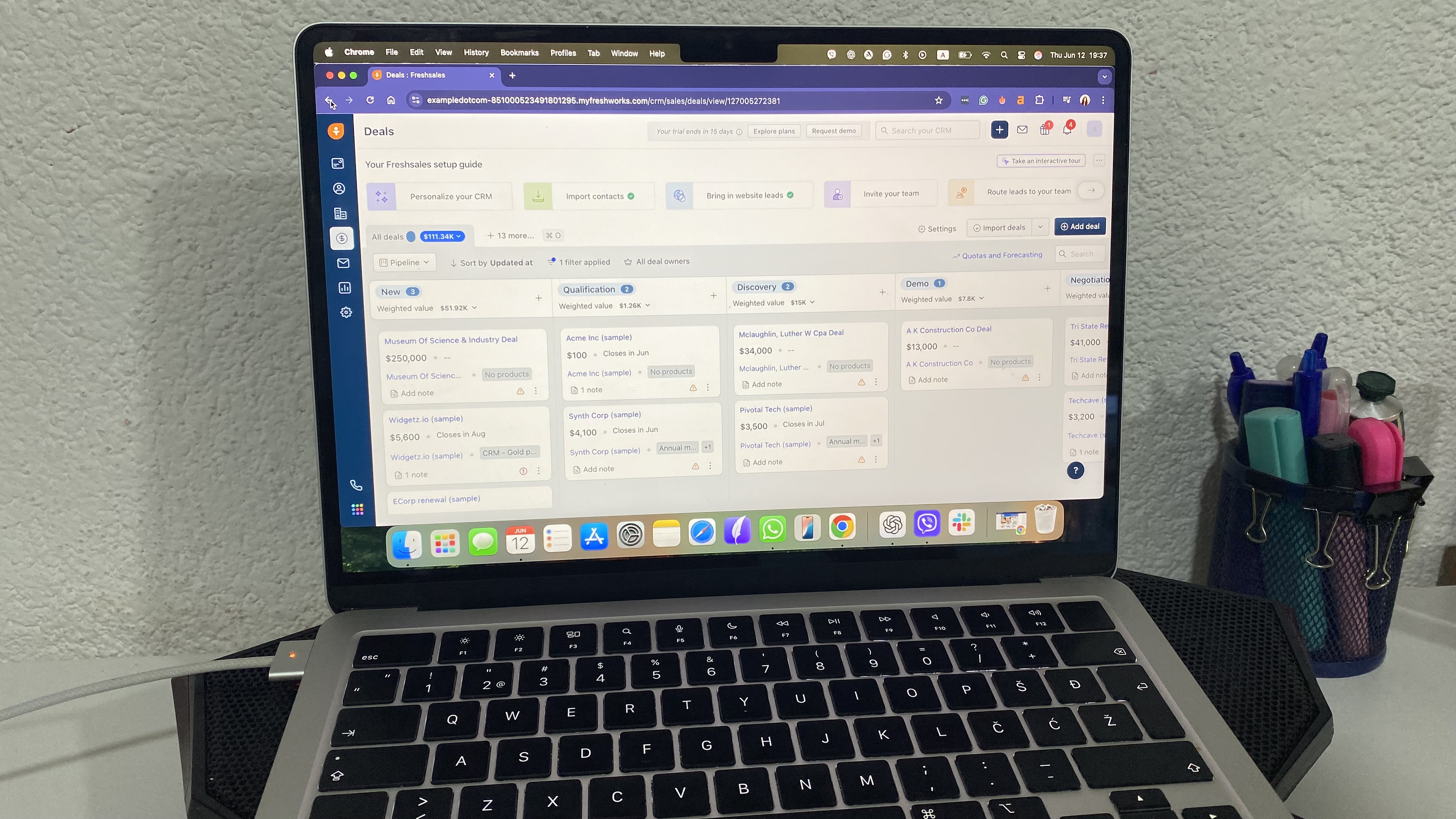
Pros:
- Clean, kanban-style pipeline that’s easy to customize
- Built-in calling, email, and lead capture tools
- Fast setup with thoughtful onboarding tips
- Solid free plan with automation for small teams
Cons:
- AI features locked behind higher-tier plans
- Doesn’t pull full contact info from email by default
- Some learning curve in customizing reports and dashboards
Freshsales checks the boxes where it matters most. It’s simple to set up, intuitive to navigate, and feels purpose-built for sales reps who want to spend more time closing and less time wrestling with their CRM.
The kanban-style pipeline is easy on the eyes and practical. Each card shows deal value, close date, and contact info at a glance, and you can drag deals through stages like you’re organizing sticky notes on a board.
You don’t need to stack on a dozen tools to get going. Freshsales bakes in the essentials: email, phone, chat, and even AI lead scoring (if you’re on a paid plan). It automatically logs your calls and emails, nudges you with task reminders, and gently guides you to the next steps with Freddy AI if you need the extra lift.
It also plays nicely with your existing stack. I synced it with Gmail, Zoom, and Slack in minutes. You can tap into 1,000+ apps via Freshworks Marketplace if you need more. And when you want numbers, the dashboards show pipeline progress, rep performance, and forecast data, without making you hunt for it.
Collaboration is solid too. You can tag teammates in notes, assign deals based on visibility rules, and keep everyone aligned without stepping on each other’s toes.
Pricing
Free forever plan for up to 3 users. Paid plans start at $9/user/month (Growth), with AI and advanced features in higher tiers.
Helpful next steps
- Read our Freshsales review
- Start a free 14-day trial
Visit site
Go to Freshsales' official website
Best sales CRM for deal pipeline visibility
Pipedrive
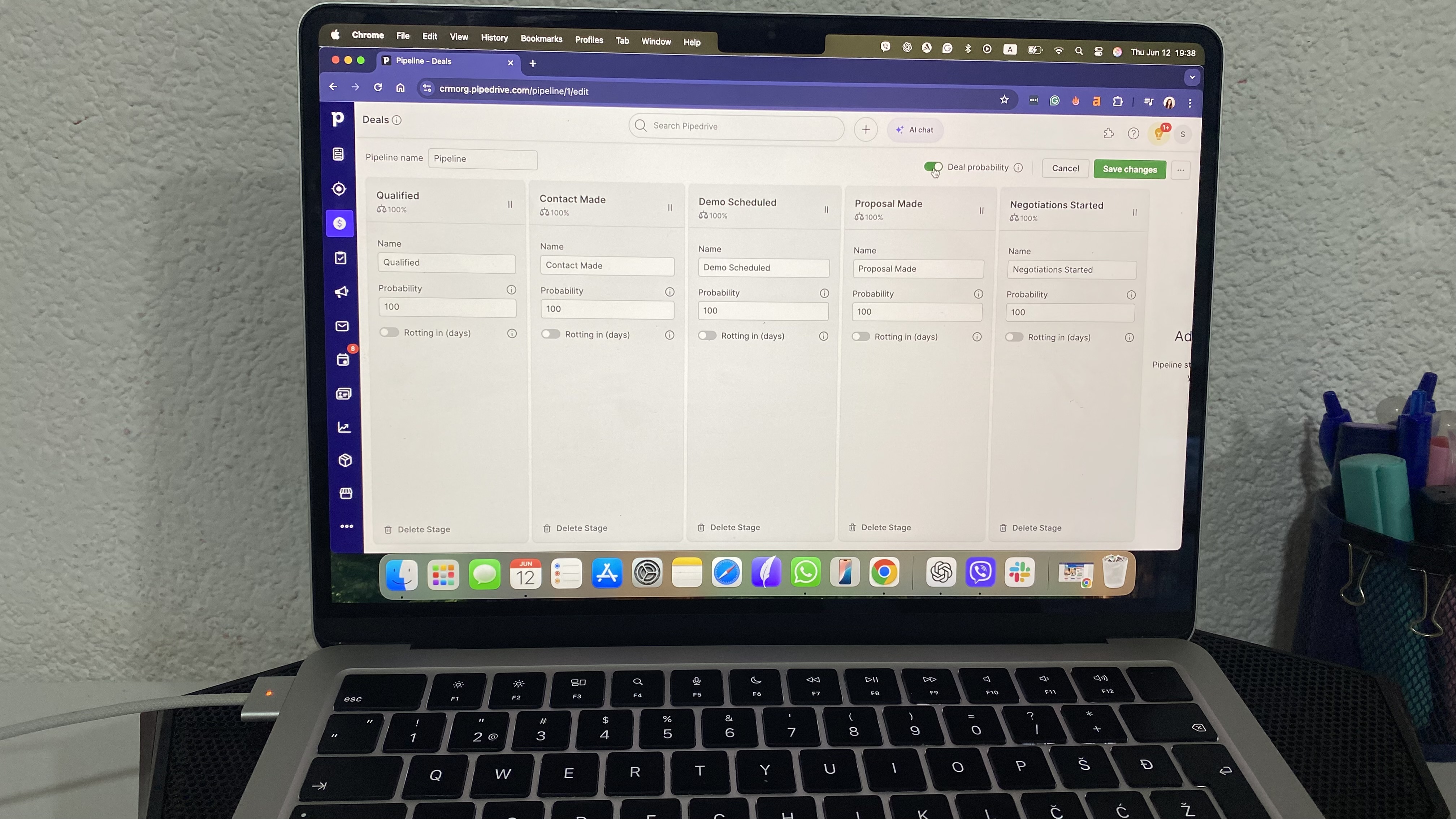
Pros
- Intuitive drag-and-drop pipeline that’s easy to customize
- Quick setup with minimal onboarding friction
- Contact records are clean, detailed, and always in context
- AI nudges help prioritize without being pushy
Cons
- No free plan, only a 14-day trial
- Add-ons like LeadBooster cost extra
- Limited native integrations beyond email/calendar
Reporting feels basic without upgrades
Pipedrive is made for sales teams that live and breathe pipelines. The moment you log in, it’s obvious: clean, color-coded columns show where every deal stands. You can drag and drop deals through stages, adjust probabilities, and rename pipeline steps without needing help from IT. The whole system is designed to help you stay focused on one thing—closing.
Setup is fast. During our testing phase, we built a pipeline in minutes, customized deal stages, and started logging calls and emails, all without getting lost in menus. The contact records are detailed but not overwhelming, with activity feeds, notes, and communication history all in one place. No hunting around.
What I appreciated most was how visual and hands-on the platform feels. You can build multiple pipelines, tweak them per team, and even automate basic tasks. AI nudges are there when you need them, quietly suggesting next steps or flagging stalled deals.
That said, some key features like web forms and lead chatbots are behind a paywall. You’ll need the LeadBooster add-on for full functionality, and integrations beyond email and calendar are limited unless you loop in third-party tools.
If your sales process is predictable and you want tight control over every moving part, Pipedrive delivers. But if you’re hoping for deep integrations or free lead capture, be ready to open your wallet.
Pricing
No free plan; paid tiers start at $14/user/month (billed annually). Add-ons like LeadBooster cost $32/month.
Helpful next steps
- Read our Pipedrive review
- Start a free 14-day trial
Visit site
Go to Pipedrive's official website
Best sales CRM for getting started fast
HubSpot CRM
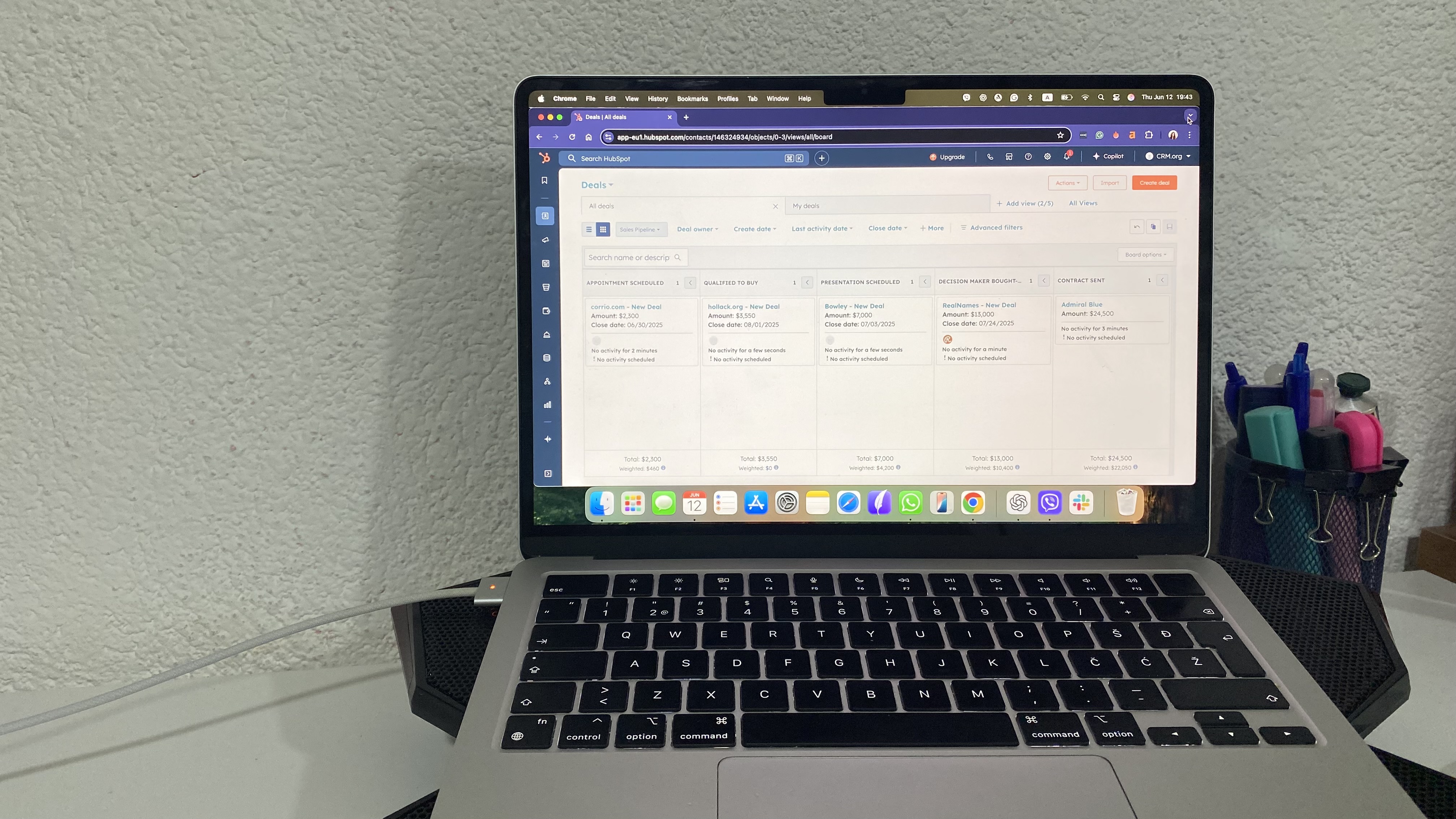
Pros
- Free plan includes pipeline, email sync, and scheduling
- Intuitive UI makes onboarding quick and painless
- Built-in lead capture tools (forms, live chat, Chrome extension)
- Basic automation included even on the free tier
Cons
- Forecasting and advanced reporting are locked behind paid plans
- No sidebar navigation (top-nav only) may confuse some users
- Higher-tier plans get pricey as your team grows
- Free plan limits you to 2 users
HubSpot CRM makes it ridiculously easy to hit the ground running. Setup took us less than 10 minutes; no onboarding wizard required. The interface is clean and minimal, though the lack of a left-hand sidebar might throw you at first. Still, once you find your footing, everything’s exactly where you’d expect it to be.
When it comes to core sales features, HubSpot gets the job done without piling on complexity. Pipelines are fully customizable and look great in the Kanban-style board. You can create multiple pipelines for different teams or deal types, add custom fields to match your workflow, and drag deals around like sticky notes on a whiteboard. It’s flexible but never overwhelming.
Activity tracking is another win. HubSpot automatically logs calls, emails, and meetings, and you can schedule follow-ups in just a couple of clicks. Plus, the Chrome extension lets you pull contact details straight from your inbox. There’s no tab juggling required.
The free tier also includes basic automation, like assigning tasks and building workflows for lead nurturing. Reporting is where you’ll start bumping into the paywall. You get simple dashboards in the free plan, but advanced forecasting and team-level performance reports are gated behind higher tiers.
Collaboration features like shared notes and @mentions are built right in, and integrations cover the usual suspects: Gmail, Outlook, Slack, Zoom, and even dialers. Everything works smoothly together, so you’re not duct-taping tools just to send a follow-up.
Pricing
Free forever for up to 2 users. Paid plans start at $15/user/month (billed annually).
Helpful next steps
- Read our HubSpot CRM review
- Start a free 14-day trial
Visit site
Go to HubSpot's official website
Best sales CRM for advanced workflows and enterprise sales ops
Salesforce Sales Cloud
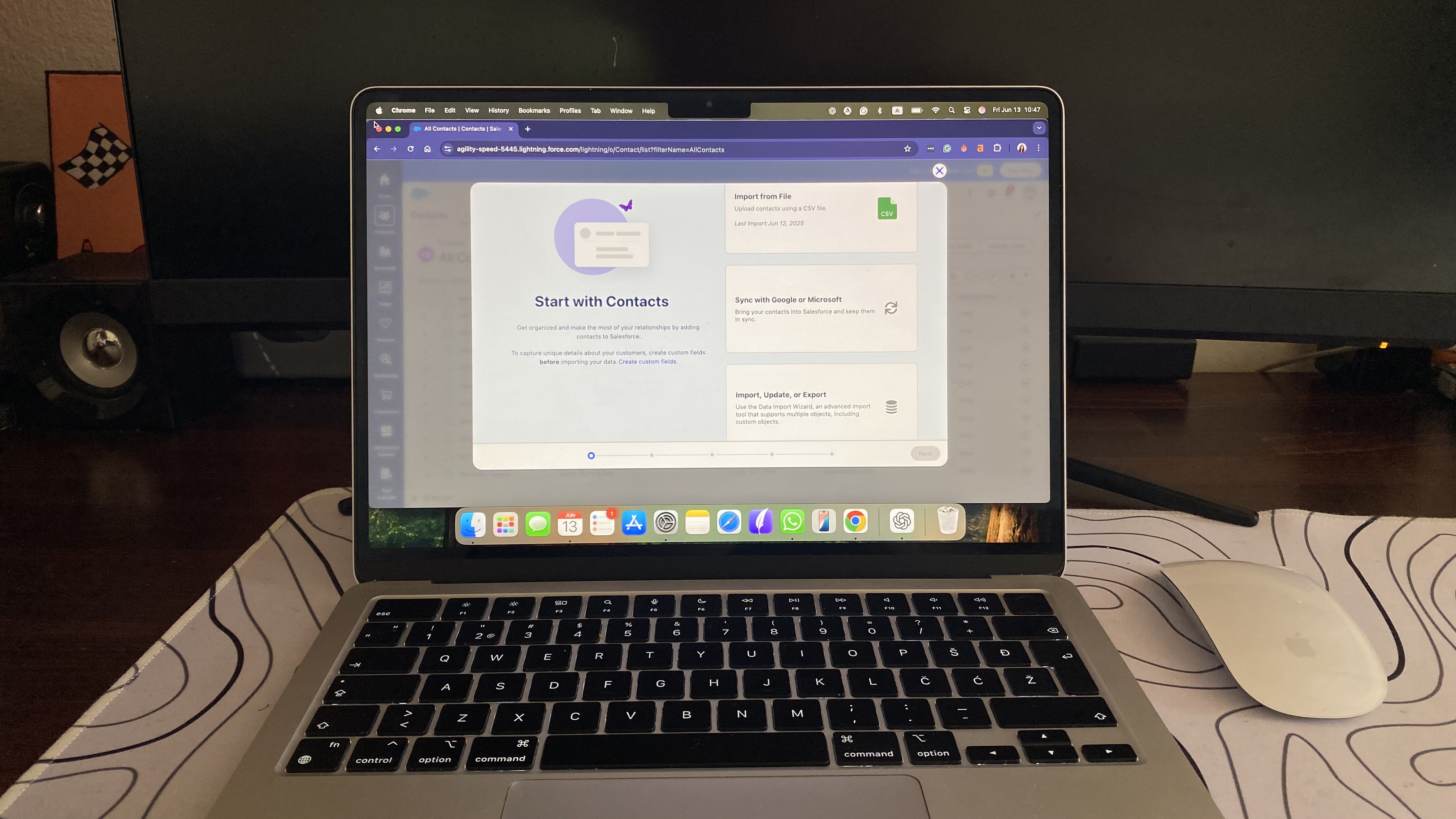
Pros
- Customizable pipelines and powerful automation tools
- Advanced reporting and AI-powered forecasting
- Deep integration options via AppExchange
- Built-in alerts and task assignment features for team coordination
Cons
- Steep learning curve without admin support
- Pricing jumps quickly across tiers
- Importing contacts is limited to CSV or Google/Microsoft sync
Salesforce doesn’t just track sales—it runs the entire machine. You get flexible pipelines with custom stages, deep reporting dashboards, and Einstein AI for deal scoring and forecasting. It’s designed for complexity, which means it thrives in multi-team environments where every touchpoint matters. Activity tracking is comprehensive (calls, tasks, meetings), and the system nudges you when it’s time to follow up, escalate, or prioritize a deal.
But ease of use? That’s where you’ll feel some friction. Salesforce doesn’t walk you through each step. Even importing contacts is more rigid than expected: just CSV uploads or Google/Microsoft sync.
And while you can build just about anything inside it, from lead workflows to custom dashboards, it’s not drag-and-drop easy. If you don’t have someone familiar with CRM setup, it’s easy to miss out on the platform’s full power. So, you might consider hiring a CRM consultant to kick things off.
Once you’re over the setup hump, though, it’s a powerhouse. The reporting suite goes deep. Multi-source pipeline data, rep leaderboards, win-rate trends, and integrations are everywhere.
I synced Gmail, Zoom, and Slack, then layered in billing tools through AppExchange. Role-based permissions and @mentions help with collaboration, and automation rules ensure your reps don’t drop the ball. If you’re scaling, this is a CRM that grows with you.
Pricing
- No free plan. Paid plans start at $25/user/month (Starter), but AI and deeper features start at $100+
Helpful next steps
- Read our Salesforce review
- Start a free 14-day trial
Visit site
Go to Salesforce's official website
Best CRM for sales and project management combo
Insightly CRM
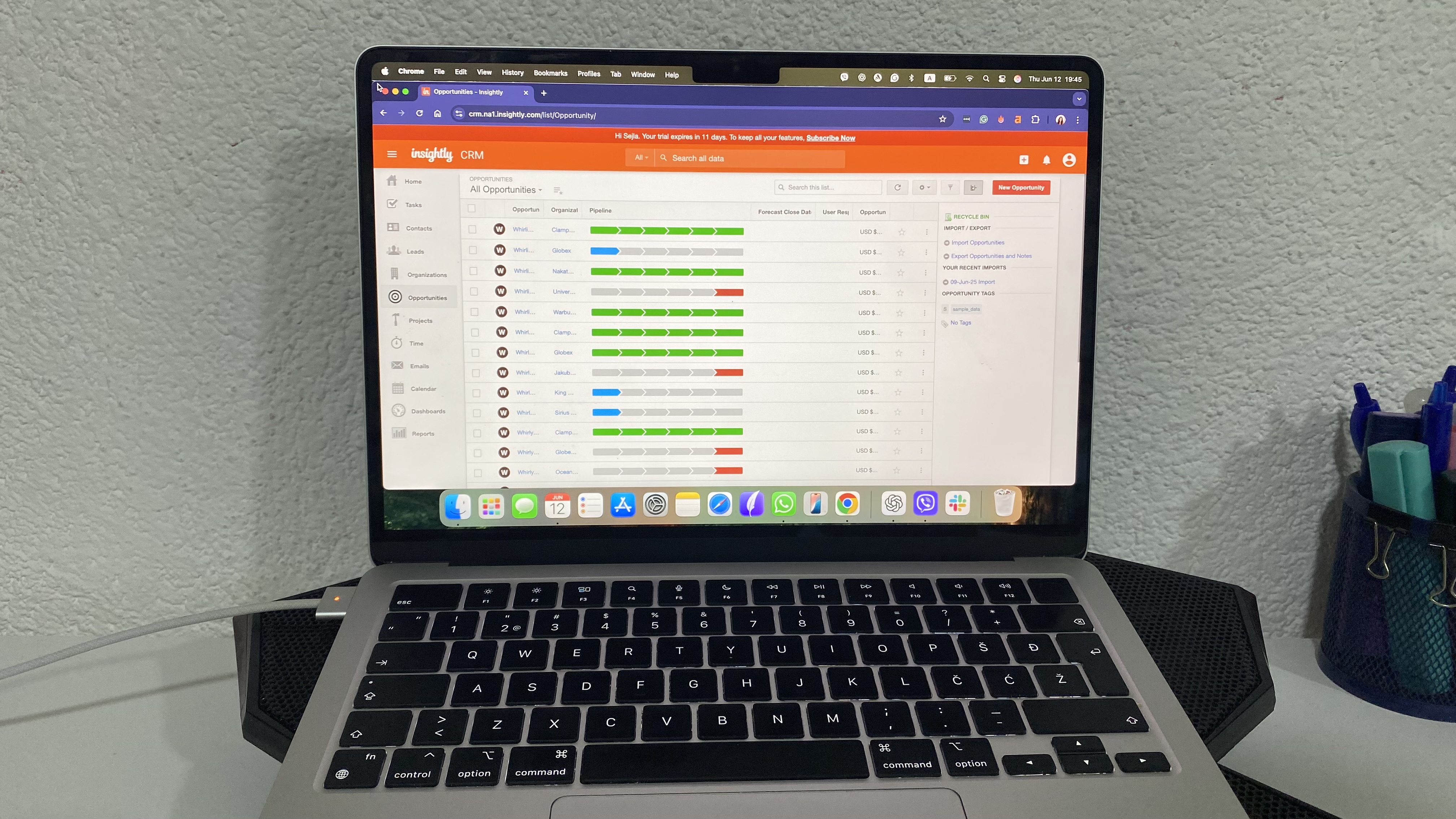
Pros
- Combines CRM and project management in one dashboard
- Clean interface with customizable pipelines and fields
- Smart deal nudges via visual progress bars and health cues
- Built-in report builder and dashboards feel easy but powerful
Cons
- No free plan, and paid tiers start higher than some competitors
- Automation feels limited for teams used to deeper logic workflows
- Less ideal for enterprise-scale forecasting or territory planning
Insightly stands out for doing what most CRMs can’t: managing your pipeline and your project delivery in the same place. It’s ideal for small to midsize teams that need to close deals and manage the work that follows without hopping between tools.
The interface is clean, and it doesn’t take long to get your bearings. There’s a sidebar for fast access, visual bars that show deal health, and automatic flags if a next step is missing, like a follow-up call or task. Those little nudges help keep things from slipping through, especially if you don’t have a full-time ops team watching the pipeline.
You can create multiple pipelines, link deals to marketing campaigns, and use custom fields to fit your workflow. Dashboards are simple but effective, giving you key metrics without overcomplicating things. Collaboration tools like shared records and @mentions help teams stay aligned, and integrations cover all the basics—email, calendar, Slack, and more.
Automation is there, but don’t expect deep logic trees. If you’re looking for basic workflows like task triggers or lead assignment, it’ll work fine. Just know, power users might find the ceiling a bit low.
Pricing
No free plan. Paid plans start at $29/user/month, billed annually. 14-day trial included.
Helpful next steps
- Read our Insightly CRM review
- Start a free 14-day trial
Visit site
Go to Insightly's official website
Best sales CRM for teams that want deep customization
Zoho CRM
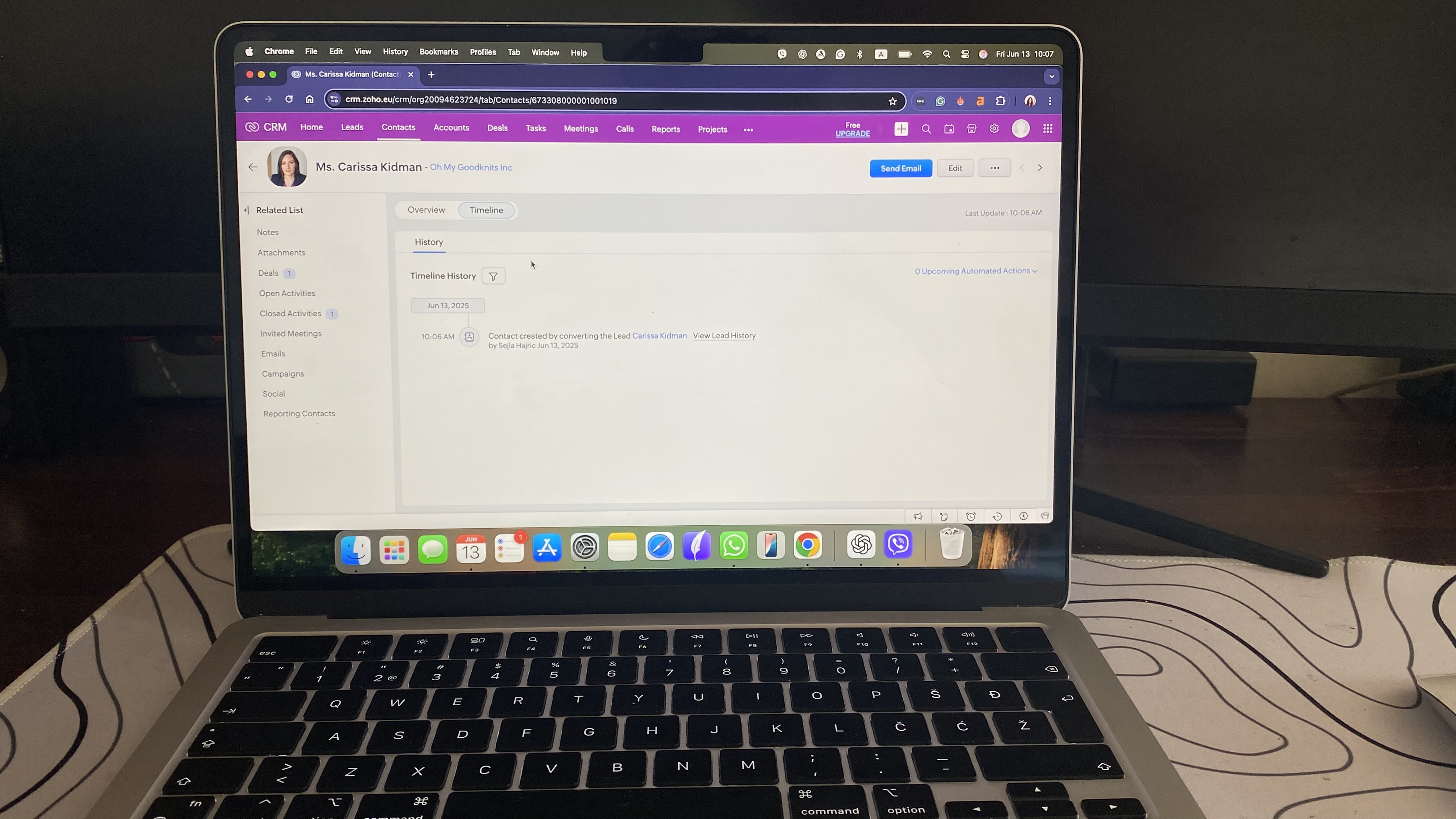
Pros
- Flexible pipeline and project management in one place
- Affordable plans with strong free-tier tools
- Excellent contact and activity tracking
- Predictive sales insights powered by built-in AI
Cons
- Setup and customization can take time
- UI looks a bit outdated on desktop
- App integrations require Zoho ecosystem buy-in
If you want a CRM that does more than track deals, and you’re not ready for enterprise bloat (and price tag), Zoho CRM hits a sweet spot. It blends traditional sales pipeline features with light project management tools, giving teams one home for everything from pre-sales to post-delivery.
When we signed up, onboarding was fast and practical. A “Getting Started” checklist walked us through setup, and the system didn’t throw too many features at us all at once. You can create custom pipelines, assign tasks, log calls, and even attach files or view past activity all from a single contact card. That’s a win for teams juggling complex sales cycles or service-heavy clients.
Where Zoho shines is its activity tracking. You can automate reminders, follow-up tasks, and email logging, so nothing falls through the cracks. Plus, Zia (Zoho’s AI assistant) helps score leads and forecast deal closures, making sure your reps focus their energy in the right places.
We also appreciated the built-in reports. Even on the free plan, you get charts that break down performance by team member, deal stage, or timeline—no need to build a dashboard from scratch or plug into another tool.
As for how it stacks up across the board: Zoho offers great flexibility (custom fields, multiple pipelines), solid collaboration tools (shared notes, @mentions, role-based access), and decent integrations if you’re within the Zoho suite. Mobile works fine, but some users might find the desktop UI dated or cluttered. Still, for growing teams balancing sales and service, it gets the job done—and then some.
Pricing
Free plan supports 3 users. Paid plans start at $14/user/month, billed annually.
Helpful next steps
- Read our Zoho CRM review
- Start a free 14-day trial
Visit site
Go to Zoho CRM's official website
Best sales CRM for outbound sales tracking
Zendesk Sell
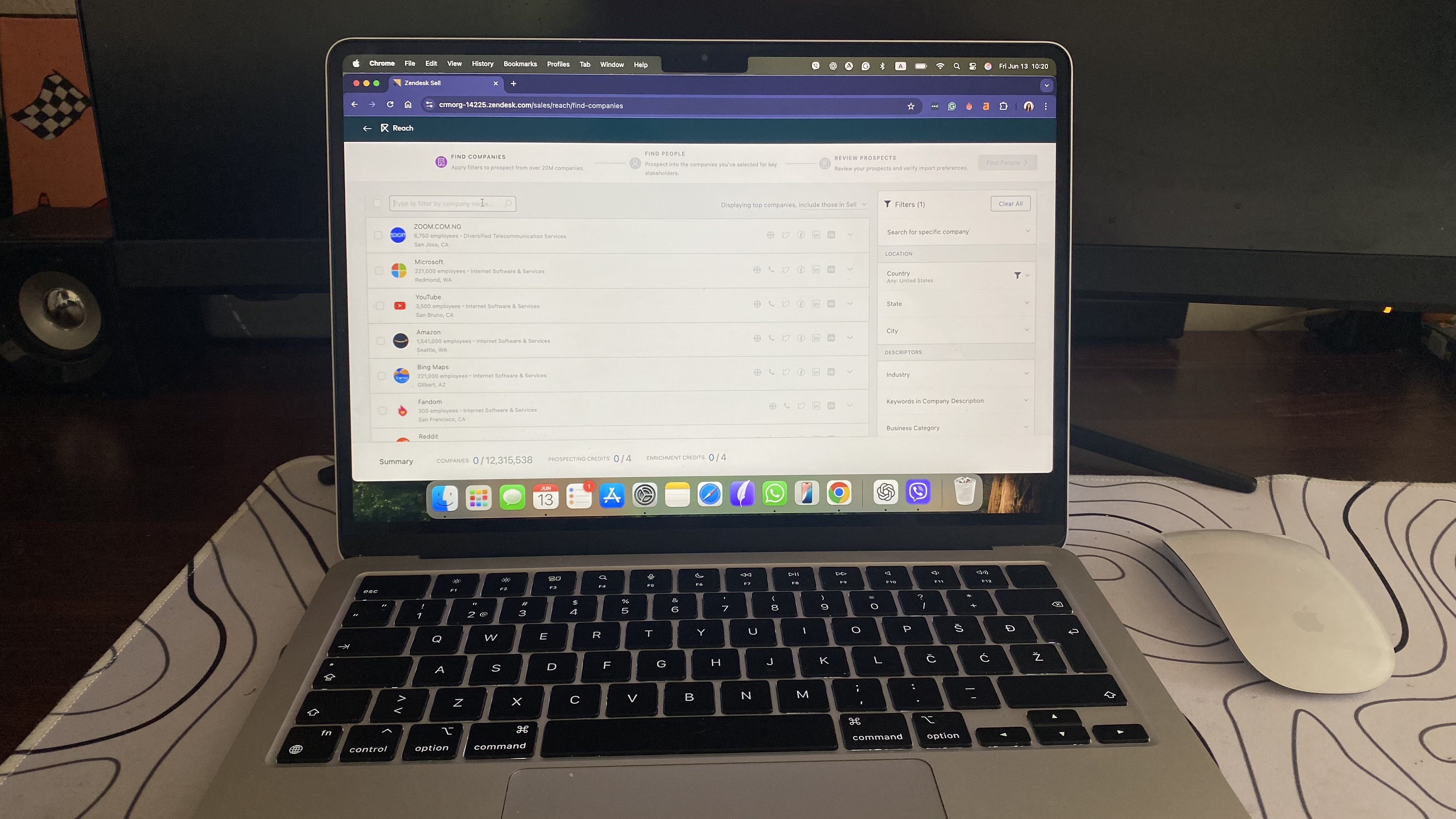
Pros
- Built-in power dialer and email tools
- Smart Lists for easy lead segmentation
- Strong mobile app for reps on the go
- Clean, simple interface with fast setup
Cons
- Light on project management features
- Limited customization in lower tiers
- Reporting lacks depth compared to top competitors
Zendesk Sell is for sales teams who live in their outreach tools—dialer, email, and follow-up reminders all in one place. If your reps are focused on calling, emailing, and moving leads through the pipeline fast, it covers the basics without unnecessary bulk. Setup takes minutes, and the interface stays friendly, even when juggling lots of deals.
Zendesk Sell might look like your standard CRM at first, but dig a little deeper, and it’s got one of the most unique native features we tested: Reach, a lead-gen engine built right into the platform. Just input your target criteria (industry, role, company size) and it’ll scan Clearbit’s database to deliver fresh, qualified leads.
Once those leads land, Smart Lists let you sort and segment them in real time, like a live spreadsheet for prioritizing your outreach.
The platform covers the essentials across our test categories. It’s easy to learn and mobile-friendly. You get customizable stages and fields (though only one pipeline per user unless you upgrade).
Activity tracking is solid—calls, tasks, and emails are logged automatically, and you can set reminders. Reporting is straightforward but not very deep. And for collaboration, shared lead visibility and @mentions help keep your team aligned, but it’s not the most advanced.
Pricing
No free plan. Paid plans start at $19/user/month, billed annually.
Helpful next steps
- Read our Zendesk Sell review
- Start a free 14-day trial
Visit site
Go to Zendesk Sell's official website
Best sales CRM for Google Workspace Teams
Copper CRM
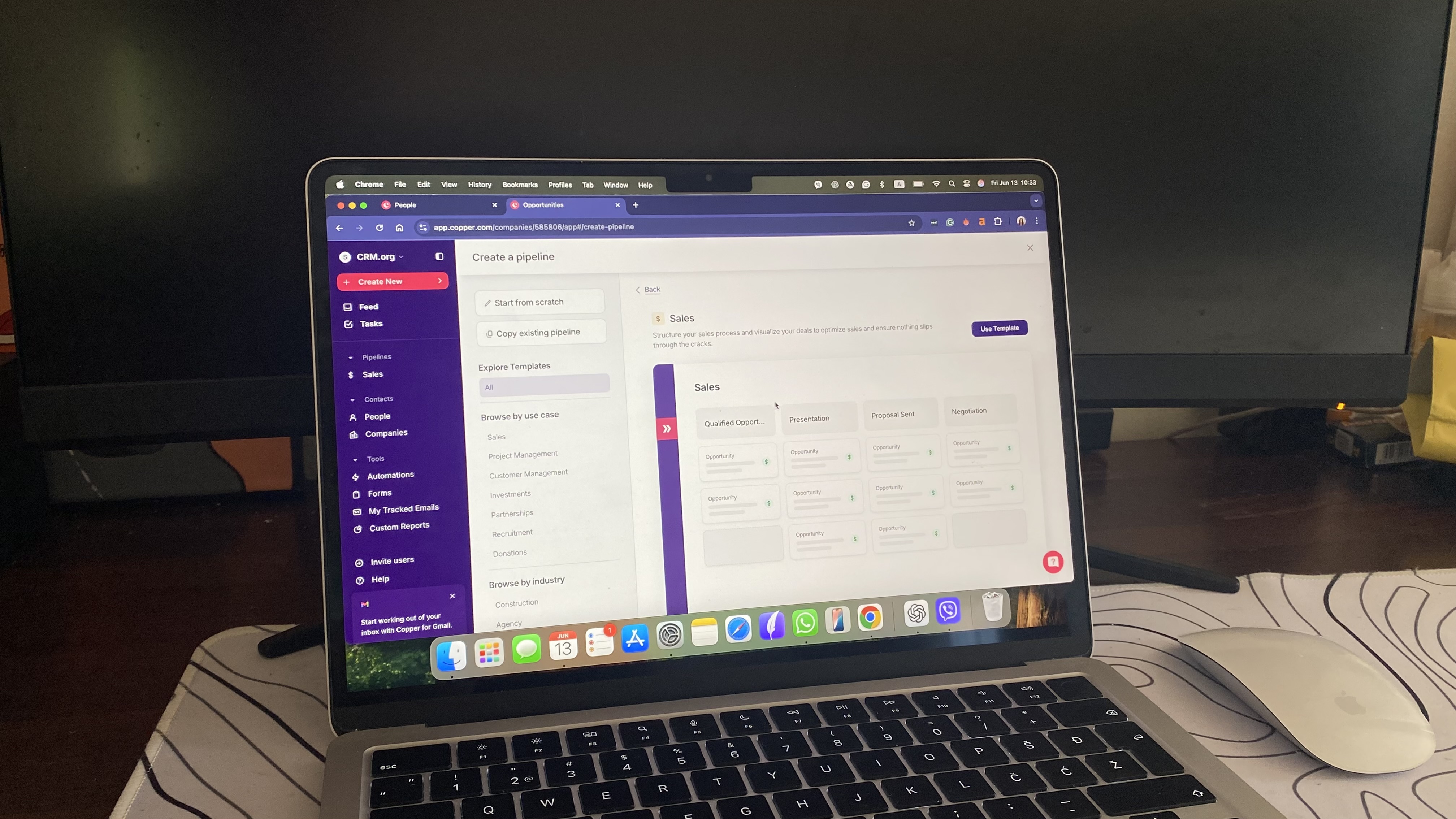
Pros
- Built directly into Gmail and Google Calendar
- Super-fast onboarding and no-code automation
- Customizable pipelines with stage-by-stage tweaks
- Auto-logs emails, calls, and follow-ups with minimal setup
Cons
- No built-in lead capture forms—requires third-party tools
- No support for Outlook or non-Google email clients
- Reporting features are basic compared to more advanced CRMs
- Doesn’t support omnichannel communications (e.g., SMS or live chat)
If your team runs on Google Workspace, Copper CRM feels like it was built just for you. It lives inside Gmail and Google Calendar, so you can manage deals, track tasks, and collaborate with your team without ever leaving your inbox. No clunky integrations, no messy toggling. Just a lightweight CRM that works the way you already do.
Copper ranks well across the core CRM needs we tested. Ease of use is a standout—setup is fast, the UI is approachable, and the mobile app mirrors the desktop experience with no hiccups. Pipeline flexibility is strong too: you can build pipelines from scratch or customize templates to match your sales process.
The tool shines at activity tracking, logging emails and calls automatically while letting you assign tasks and follow-ups with just a few clicks. Reporting and forecasting are basic but clear, with dashboards showing pipeline health and rep performance. Integrations focus heavily on Google apps—great for G Suite users, limiting for others. And while collaboration tools are minimal, features like shared notes and @mentions cover most daily needs.
This isn’t the tool for enterprise sales ops or complex sales orgs. But for small-to-midsize teams who already live in Gmail? Copper keeps things clean, fast, and simple—so you can focus on selling, not syncing.
Pricing
Copper doesn’t offer a free plan, just a 14-day trial. Starter plan begins at $9/user/month (billed annually).
Helpful next steps
- Read our full Copper CRM review
- Start a free 14-day trial
Visit site
Go to Copper CRM's official website
Best sales CRM for effortless sales & marketing automations
Keap
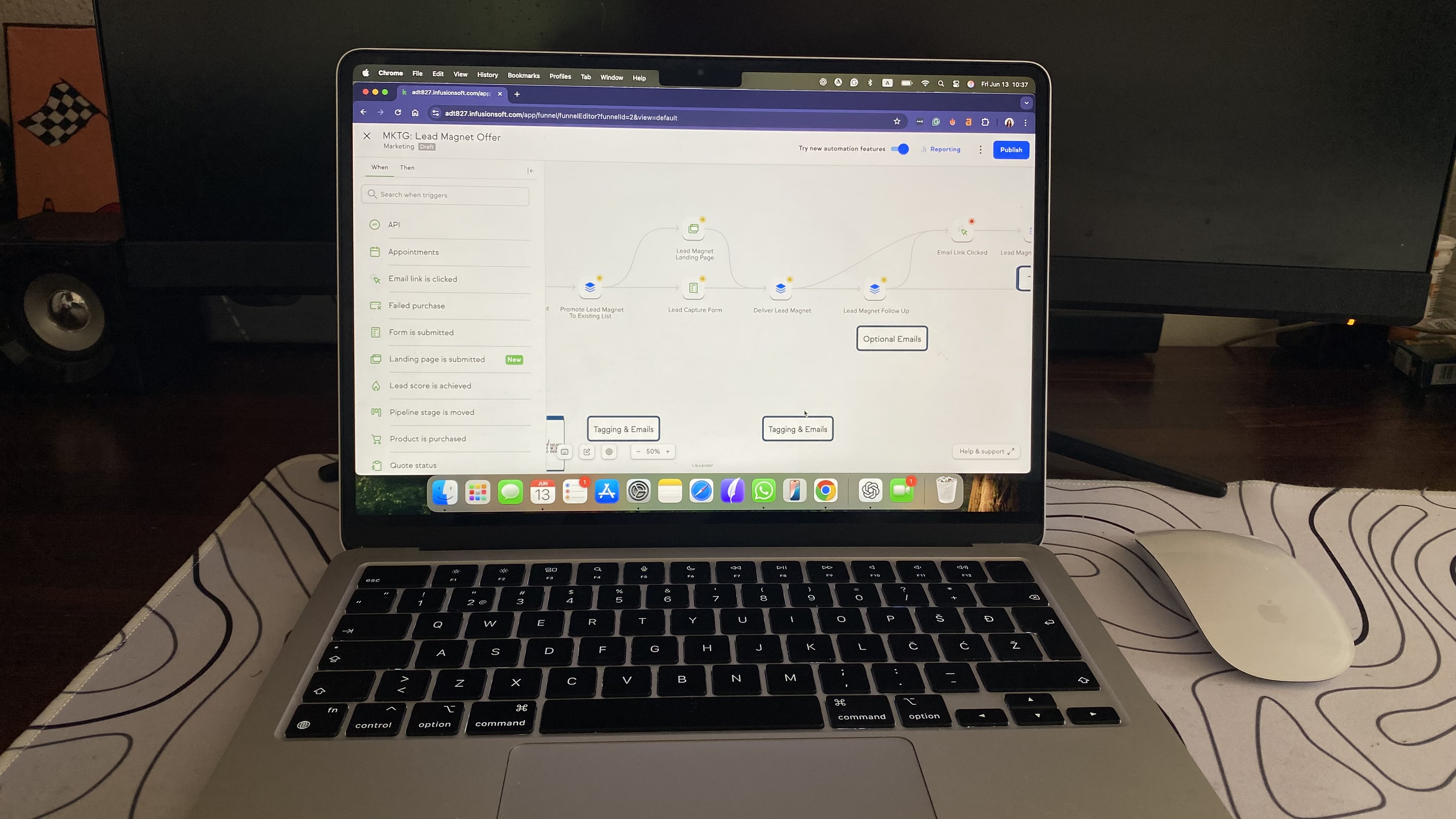
Pros
- Visual automation builder is easy to learn
- Drag-and-drop deal pipelines with automation triggers
- Built-in forms, landing pages, and schedulers
- Custom dashboards help prioritize work
Cons
- Expensive entry pricing
- Reporting features feel limited
- Integrations are somewhat narrow
Keap’s strength lies in its all-in-one approach. It’s a marketing automation toolkit wrapped inside a sales pipeline. From the moment a lead fills out a form on your site, Keap can tag them, drop them into a sequence, send a follow-up email, and alert your team, all without you lifting a finger.
I appreciated how visual the whole thing is. The automation builder feels more like a mind map than a script, and you can drag in triggers like “form is submitted” or “deal stage moves” to build custom flows.
Setting up the pipeline is just as smooth. You can start from scratch or use a template, rename stages, assign probabilities, and attach automations to each step. When a deal moves forward, Keap can automatically send a proposal, schedule a meeting, or update a field. It gently guides you through the logic without making you feel like you need to learn a new language.
Collaboration is a bit lighter here; it’s more about centralizing client info than about deep rep-to-rep teamwork. But if you’re a small business or agency looking to keep marketing and sales in sync, Keap makes a strong case. The mobile app is capable but not as fully featured as the desktop version.
Across our test criteria, Keap does well in automation and ease of use. The onboarding is beginner-friendly, and the platform grows with you, though you’ll pay more as you scale. Reporting and forecasting are functional but not as customizable as what you’d get from CRMs like Pipedrive or Zoho. Still, if your top priority is automating lead capture and follow-up, Keap saves hours right out of the gate.
Pricing
No free plan, just a 14-day trial. Paid plans start at $249/month (2 users, 1,500 contacts), billed annually.
Helpful next steps
- Read our Keap review
- Start a free 14-day trial
Visit site
Go to Keap's official website
Best sales CRM for task-based workflows
Monday CRM
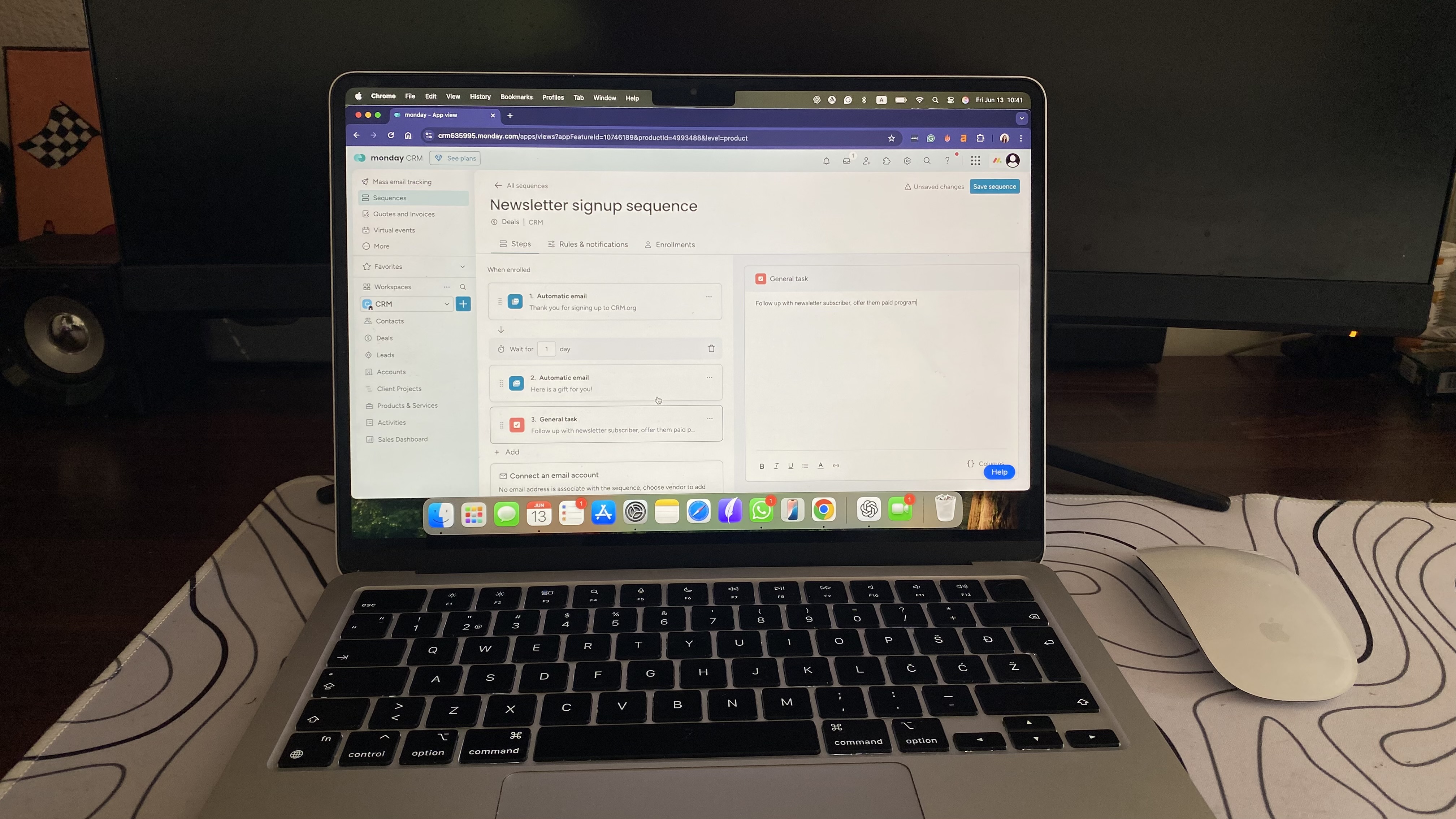
Pros
- Intuitive UI and built-in onboarding for quick ramp-up
- Combines CRM and project management in one platform
- Smart automation builder with email + task sequences
- Built-in AI for writing emails and summarizing meetings
Cons
- Slight learning curve if you’re new to monday’s layout
- No free plan, just a 14-day trial
- Automation center can feel overwhelming at first
If you’ve used monday.com as a project management tool before, stepping into its CRM is like walking into a familiar room with a few new buttons on the wall. It’s the same clean layout: colorful status columns, drag-and-drop boards, and a tidy left-hand panel that makes navigation easy. I appreciated how gently it walks new users through each workspace, offering pop-ups and checklists right from the start.
Its automation builder is surprisingly beginner-friendly. I set up a full email sequence with wait steps and task reminders in just a few clicks. There’s even a built-in AI assistant that drafts emails and summarizes meeting notes to save you time.
Pipeline flexibility is solid: you can customize deal stages, add custom fields, and even run multiple boards to simulate parallel pipelines. The system adapts to different workflows, though it’s not as focused on traditional funnel metrics as some other tools. Reporting is available but limited on lower-tier plans.
Integrations cover most of the essentials—email, calendars, and a wide range of third-party apps via Zapier or native connectors. But unlike some CRMs, you won’t find deep sales dialer tools or Slack-specific features built in. Collaboration is more task-focused than communication-heavy. You can assign tasks, @mention teammates, and share boards, but it’s not built for threaded convos or role-based visibility at scale.
Pricing
No free plan. Starts at $12/user/month (billed annually)
Helpful next steps
- Read our monday CRM review
- Start a free 14-day trial
Visit site
Go to monday.com's official website
Best sales CRM for efficient communication & lead management
Close CRM
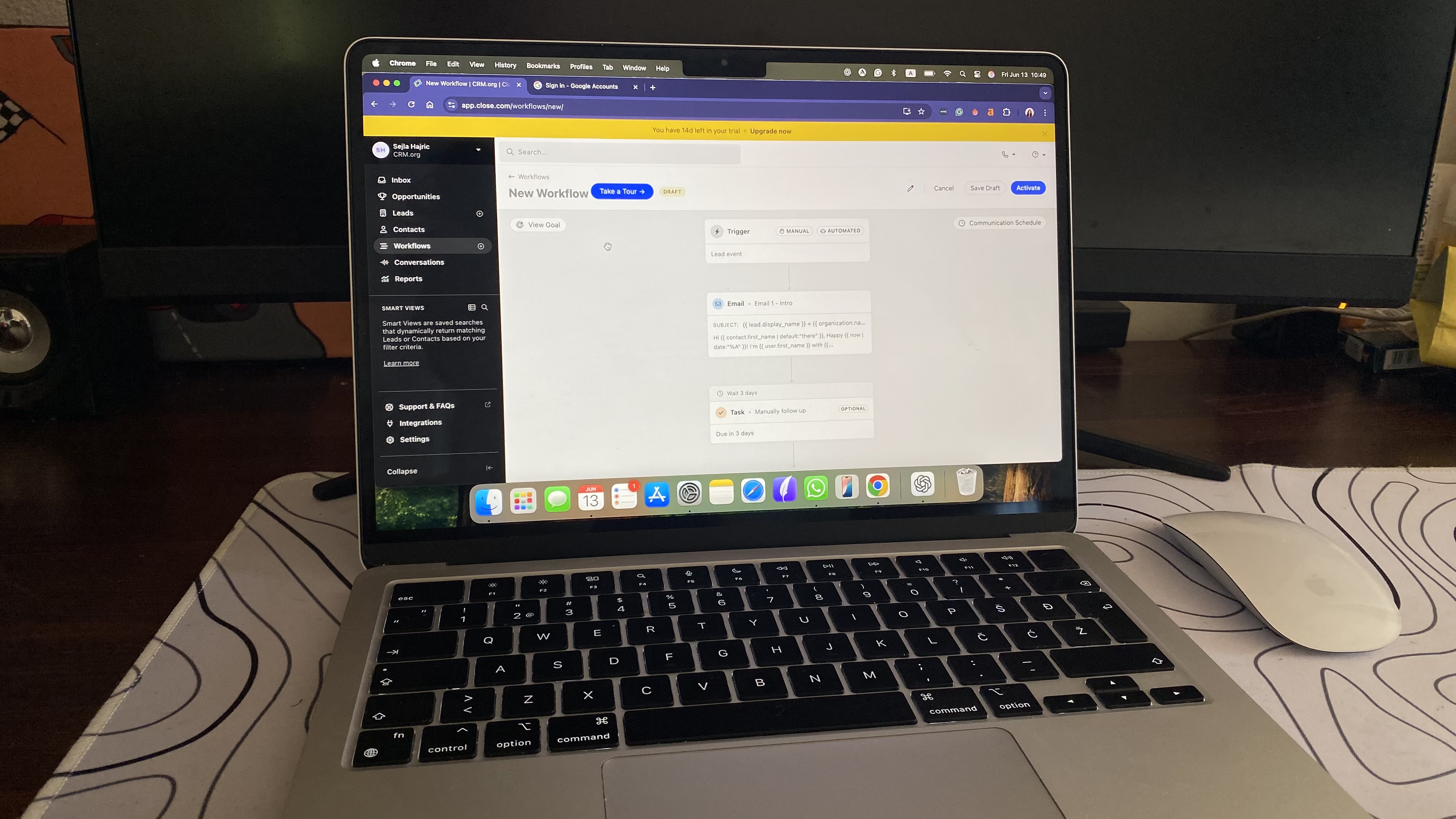
Pros
- Smart Views help reps stay focused on warm leads
- Automations are quick to set up—no Zapier required
- Multiple pipelines and customizable fields support tailored sales workflows
- Calls, emails, and texts are auto-logged without extra effort
Cons
- Unified inbox view can feel overwhelming at first
- Reporting and forecasting tools are only available on higher tiers
- Limited team collaboration features (no shared comments or @mentions)
Close CRM is built for sales teams that want to move fast without juggling half a dozen tools. Everything revolves around the inbox—a unified feed where calls, emails, tasks, and SMS conversations land in one place. It’s not your typical CRM layout, and honestly, it takes a moment to adjust. But once you do, it keeps you laser-focused on what needs attention now.
The Smart Views feature is a standout: it filters your pipeline automatically based on lead status, activity, or urgency. That means less scrolling, more closing. And if you’re tired of manual follow-ups, Close makes it easy to build automated workflows. You can trigger an email, add a wait step, and assign a task, all in a few clicks. It’s simple enough for non-techies, and powerful enough to replace basic external automation tools.
Pipeline customization is strong. You can create multiple pipelines, rename deal stages, and track the fields that matter to your team. Activity tracking works out of the box, logging every interaction automatically. Where it stumbles is collaboration: there’s no native way to leave internal comments or tag teammates. Reporting is solid, but only if you’re on the Professional plan or above.
Pricing
No free plan, only 14-day trial. Paid plans start at $19/user/month, billed annually.
Helpful next steps
- Read our Close CRM review
- Start a free 14-day trial
Visit site
Go to Close CRM's official website
How the right CRM can help sales reps win more deals
Sales CRMs exist for one reason: to help reps close more deals. If you’ve ever lost a hot lead to a cluttered inbox, spent half your morning updating a spreadsheet, or watched a deal quietly vanish with no clue why, it probably wasn’t bad luck. You just didn’t have the right system backing you up.
And the numbers back it up: salespeople who use a CRM properly often see their up to 29% increase in their sales.
Here’s what usually goes wrong in sales and how the right CRM can fix it.
Leads slip through the cracks
It’s too easy to forget a follow-up when your leads live across email threads and spreadsheets. And when there’s no clear ownership, opportunities fall flat. A sales CRM keeps everything in one place—contacts, deals, tasks. It pings you when it’s time to follow up, flags quiet leads before they ghost you, and makes sure every rep knows exactly who’s handling what.
Too much time on admin, not enough on selling
If your reps spend more time logging calls than making them, something’s off. Manual data entry, scheduling, and follow-up emails steal hours from actual selling. With a CRM, admin work happens in the background. It logs activity automatically, fills in contact data, offers ready-made email templates, and books meetings with a single click—freeing reps to focus on closing.
No visibility into the sales pipeline
Without a clear view of the pipeline, forecasting feels like guessing and reps end up chasing the wrong deals. Leaders can’t see what’s working, and sellers can’t tell what’s next. CRMs break it down visually: deal stages, values, close probabilities. You get live pipeline insights, stuck deal alerts, and dashboards that actually help you plan, not panic.
Inconsistent sales processes across reps
When every rep runs their own playbook, performance is uneven, and new hires struggle to keep up. The result? Missed steps, missed deals, and missed targets. A CRM brings structure. It defines sales stages, embeds your playbook into every deal, and tracks who’s following the process. New reps ramp faster, and your whole team runs like a system, not a scramble.
Poor handoff between sales and other teams
Closing the deal is just the beginning—but without context, post-sale teams are flying blind. Customers repeat themselves, and internal teams miss key info. A good CRM ensures smooth handoffs. It stores deal history, syncs with tools like billing and customer success platforms, and shares all the details your teammates need—so everyone stays aligned and customers feel the continuity.
You don’t need a perfect CRM. You need one that works for you.
Every sales team is different—and that’s okay. The best CRM is the one that supports your workflow, helps you stay focused, and grows with you (without driving you up the wall).
Most of the CRMs above offer free trials. Try one, give it a week, and see how it feels. You’ll know when it clicks.
Want more help? Explore these next:
Sales CRM Software: FAQs
How will I move all our existing data into the new CRM?
You won’t have to copy-paste a thing. Most CRMs let you import spreadsheets or migrate directly from other platforms (like Salesforce or HubSpot). Good ones offer guided import tools or concierge onboarding to keep your contacts, deal history, and emails intact.
Look for CRM with: CSV import, API integrations, or dedicated migration support.
Will it slow my team down or free them up?
If the CRM feels like homework, your reps won’t use it. Choose one that auto-logs emails, syncs calendars, and works on mobile. A CRM should feel invisible in the best way—saving your team time instead of adding steps.
Look for CRM with: Email sync, 1-click updates, mobile apps with offline mode.
Can we customize the CRM to match our sales process?
You shouldn’t have to rewire your workflow just to fit the tool. The best CRMs let you build pipelines, rename stages, add custom fields, and automate weird-but-critical steps.
Look for CRM with: Custom pipelines, workflow builders, field-level permissions.
Can my sales CRM integrate with all our tools?
A CRM should plug into the stack you already use. Check for native integrations with email, calling tools, and messaging apps. Bonus points if you don’t need Zapier to connect the basics.
Look for CRM with: Gmail/Outlook sync, Slack/Teams integration, native integrations.
How fast can we get up and running and see value?
You shouldn’t need a dedicated admin or a 3-week training. Top CRMs guide you through setup, let you start small, and deliver value on Day 1, even if you scale later.
Look for CRM with: No-code setup, onboarding checklists, quick-start templates.
How much does sales CRM cost over time?
It depends on the CRM, the plan you opt for, and number of users. Watch out for features locked behind premium tiers. Some CRMs charge for basic reporting or automations, and costs can balloon fast as your team grows.
Look for CRM with: Transparent pricing, per-user costs, tier comparison pages.




